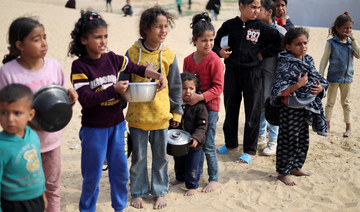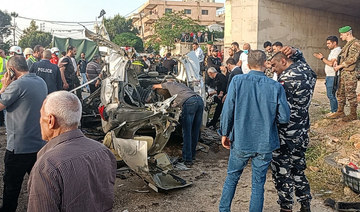BEIRUT: Lebanon’s worsening economic crisis, which culminated with the tiny nation defaulting on its debt this year, is making it increasingly difficult to attract investors for the country’s ailing electricity sector, the energy minister said Thursday.
This in turn makes it harder to reform the state-run sector as required by the International Monetary Fund and also for international donors to provide Lebanon with financial assistance, Raymond Ghajar said. Still, he said the government is working on reforming the highly subsidized sector and has made important steps in that direction recently.
Ghajar spoke to The Associated Press Thursday amid an electricity crisis that has plunged much of the country in darkness, adding to the gloom of a deepening economic and financial crisis in the country.
The cuts, stretching in some cases to 20 hours a day, have led generator providers to shut down their machines for several hours a day to ration existing fuel. As a result, traffic lights in Beirut have been turned off and hospitals have struggled to make sure their surgeries and other work can continue without interruption.
Blackouts have been a fixture of life in this Mediterranean country since the 1975-1990 civil war, with successive governments failing to agree on a permanent solution for the chronic electricity failures, largely because of profiteering, endemic corruption and mismanagement.
The energy sector has been a huge drain on state coffers for decades.
The electricity company makes annual losses of up to $1.5 billion, which have cost the state more than $40 billion over the past decades. Reforming the sector has been a key demand of international donors, the World Bank and the International Monetary Fund.
Ghajar said some steps toward reform have been taken, such as last week’s naming of a new board of directors for Electricite du Liban, or EDL, the state monopoly. An electricity regulatory authority should be appointed before the end of the year, he said, though he did not mention any concrete steps for how the government plans to overhaul the sector, including whether it plans to improve bill collection.
“Lebanon can no longer afford to subsidize its people,” said Ghajar, a Lebanese-Canadian, referring to consumer prices that have not changed since 1996. “This is an industrial service that needs to be paid for fairly for everybody.”
Lebanese people, however, already pay for generators that provide backup power through the daily outages, and electricity prices cannot be increased before the state is able to provide round-the-clock electricity.
Ghajar painted a grim picture of Lebanon’s current trajectory but said that a deal with the IMF would help regain some confidence that might lure investors once again.
The government had turned to power plant manufacturers, including General Electric and Siemens for building power plants. China has also expressed interest. But Ghajar said the country's myriad problems make it difficult for the government to comply with the conditions that would be required by private investors.
“After the default, this became practically impossible,” said Ghajar referring to Lebanon’s first ever default in March to pay back its debt that stood at $90 billion — nearly 170% of its GDP. Almost half of the country’s massive debt was caused by the electricity sector.
“You know, nobody, in my opinion, is going to come and build you a $500 million power plant and say, I don’t want anything from you, just sign here,” Ghajar said.
He blamed wide power cuts over the past month on two faulty fuel shipments involving the Algerian state energy firm Sonatrach, which forced Lebanon to use — and ration — the reserves it has.
Ghajar said he expects the power cuts to start easing soon, with more fuel shipments on their way.
Minister: No investors for Lebanon's ailing power sector
https://arab.news/r2qh7
Minister: No investors for Lebanon's ailing power sector

- The energy sector has been a huge drain on state coffers for decades
- The electricity company makes annual losses of up to $1.5 billion
Egypt mourns death of Iran’s president

- The Egyptian president expressed Egypt’s solidarity with the leadership and people of Iran during this tragic time
CAIRO: Egypt mourned the deaths of Iran’s President Ebrahim Raisi and Foreign Minister Hossein Amir-Abdollahian.
Egypt’s presidency said in a statement: “It is with deep grief and sorrow that the Arab Republic of Egypt mourns the death of the President of the Islamic Republic of Iran, Ebrahim Raisi, Iran’s Minister of Foreign Affairs Hossein Amir-Abdollahian and their escorts on Sunday in a tragic crash.
“President Abdel Fattah El-Sisi extends his sincere condolences to the people of Iran, asking Allah to envelop President Raisi and the deceased with his mercy and grant solace and comfort to their families.”
The Egyptian president expressed Egypt’s solidarity with the leadership and people of Iran during this tragic time.
Meanwhile, Egypt’s Minister of Foreign Affairs Sameh Shoukry extended his condolences to the Iranian government and people over the deaths of Raisi and Amir-Abdollahian, according to ministry spokesperson Ahmed Abu Zeid.
A helicopter carrying Raisi, Amir-Abdollahian, and several other officials crashed in mountainous terrain in the country’s northwest on Sunday. On Monday, Tehran announced the deaths of Raisi, Amir-Abdollahian, and their accompanying delegation in the crash.
Israel calls ICC prosecutor’s bid for PM arrest warrant a ‘historical disgrace’

- Katz denounced the move as a “scandalous decision” that amounted to “a frontal attack... on the victims of October 7“
- The minister added that Israel would establish a special committee to fight the ICC prosecutor’s efforts to secure a warrant
JERUSALEM: Israel on Monday slammed as a “historical disgrace” an application by the prosecutor of the International Criminal Court for an arrest warrant for Prime Minister Benjamin Netanyahu.
The prosecutor, Karim Khan, applied for arrest warrants against Netanyahu and Defense Minister Yoav Gallant as well as top Hamas leaders on suspicion of war crimes and crimes against humanity.
Foreign Minister Israel Katz said that Khan “in the same breath mentions the Prime Minister and the Minister of Defense of the State of Israel alongside the abominable Nazi monsters of Hamas — a historical disgrace that will be remembered forever.”
The prosecutor said he was seeking warrants against Netanyahu and Gallant for crimes including “wilful killing,” “extermination and/or murder” and “starvation.”
Katz denounced the move as a “scandalous decision” that amounted to “a frontal attack... on the victims of October 7” when Hamas launched their attack on Israel, sparking the Gaza war.
The minister added that Israel would establish a special committee to fight the ICC prosecutor’s efforts to secure a warrant, and also embark on a diplomatic push against it.
Katz said he planned to “speak with foreign ministers in leading countries of the world so that they oppose the prosecutor’s decision and announce that, even if orders are issued, they do not intend to enforce them on the leaders of the State of Israel.”
35,562 Palestinians killed in Gaza offensive since Oct. 7 — health ministry

- 106 Palestinians were killed and 176 injured in the past 24 hours
DUBAI: More than 35,562 Palestinians have been killed and 79,652 injured in the Israeli military offensive on Gaza since Oct. 7, the Gaza health ministry said in a statement on Monday.
One hundred and six Palestinians were killed and 176 injured in the past 24 hours, the ministry added.
Source close to Hezbollah says 4 dead in Israeli strikes on Lebanon

- The source close to Hezbollah told AFP that “at least four Hezbollah fighters were killed in Israeli raids on two different sites in southern Lebanon“
- The Israeli military said fighter jets struck “a Hezbollah terrorist cell”
BEIRUT: A source close to Hezbollah said four fighters were killed Monday in south Lebanon, with the Iran-backed group announcing two dead and a retaliatory attack, while Israel claimed strikes.
Hezbollah, a Hamas ally, has traded near daily cross-border fire with Israeli forces since the Palestinian group’s October 7 attack on southern Israel that sparked the war in Gaza.
The source close to Hezbollah told AFP that “at least four Hezbollah fighters were killed in Israeli raids on two different sites in southern Lebanon,” identifying the locations as Naqura on the coast and Mais Al-Jabal, a border village to the east.
The Shiite Muslim movement said two of its fighters, both from Naqura, had been killed, without providing further details.
The Israeli military said fighter jets struck “a Hezbollah terrorist cell” and a launch post in the Mais Al-Jabal area, while Israeli army “artillery fired to remove a threat” in the Naqura area.
Hezbollah said it launched a heavy rocket attack at an Israeli army barracks in the country’s north “in retaliation” for the Naqura strike, while also announcing other attacks on Israeli positions.
Lebanon’s official National News Agency (NNA) reported Israeli strikes on Mais Al-Jabal and Naqura, where it said Israel fired near Hezbollah-affiliated rescue personnel and wounded a civilian.
The fighting has killed at least 423 people in Lebanon, mostly militants but also including 82 civilians, according to an AFP tally.
Israel says 14 soldiers and 11 civilians have been killed on its side of the border.
The violence has raised fears of all-out conflict between Hezbollah and Israel, which went to war in 2006.
War monitor says Israeli strikes kill six pro-Iran fighters in Syria

- A Hezbollah source said that at least one fighter from the group was killed in Israeli strikes in the Qusayr area
Beirut: A war monitor said at least six pro-Iran fighters were killed Monday in Israeli strikes in Syria near the Lebanese border, in an area where Lebanon’s powerful Hezbollah group holds sway.
The Syrian Observatory for Human Rights said “Israeli strikes targeted two positions of pro-Iran groups in the Homs region,” including “a Hezbollah site in the Qusayr area” near the border where “six Iran-backed fighters were killed.”
The Observatory did not specify their nationalities.
A Hezbollah source told AFP that at least one fighter from the group was killed in Israeli strikes in the Qusayr area.
Israel rarely comments on individual strikes in Syria but has repeatedly said it will not allow its arch-enemy Iran to expand its presence there.
On Saturday, the Observatory said an Israeli drone strike near the Lebanese border targeted a vehicle carrying “a Hezbollah commander and his companion,” without reporting casualties.
Hezbollah did not announce any deaths among its ranks on Saturday.
On May 9, Israeli strikes on Syria targeted facilities belonging to Iraq’s Al-Nujaba armed movement, the Observatory and the pro-Iran group said, with Damascus saying an unidentified building was attacked.
The Israeli military has carried out hundreds of strikes in Syria since the outbreak of the civil war in its northern neighbor in 2011, mainly targeting army positions and Iran-backed fighters including from Lebanon’s Hezbollah group.
But the strikes increased after Israel’s war with Hamas in the Gaza Strip began on October 7, when the Iran-backed Palestinian militant group launched an unprecedented attack against Israel.
Syria’s war has killed more than half a million people and displaced millions more since it erupted in 2011 after Damascus cracked down on anti-government protests.






















